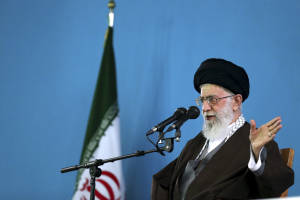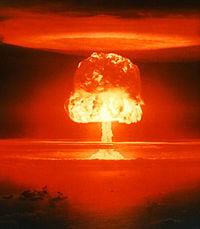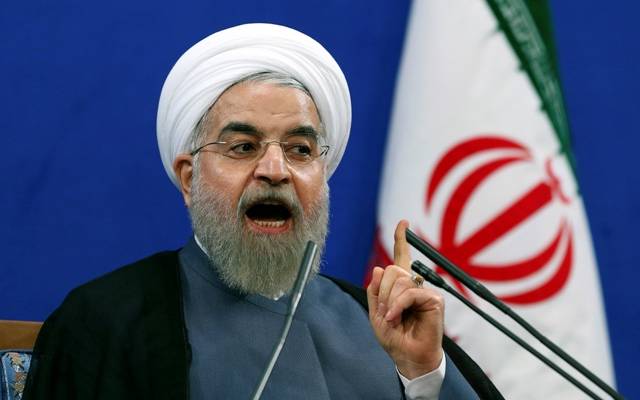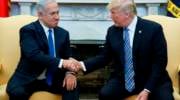As the deadline for a nuclear deal nears, Iran’s President Rouhani said there are still many gaps in negotiations between the two sides, but he expressed confidence that they can be bridged.
Iranian President Hassan Rouhani said on Saturday that the Islamic Republic and the P5+1 powers still have many differences over the details of a final nuclear agreement, although reaching a comprehensive agreement is still possible and “within reach” ahead of the June 30th deadline.
Rouhani told a press conference on the second anniversary of his election that negotiations between Iran and the six-nation group – the US, Russia, China, Britain, France and Germany – are making progress, although substantial gaps remain.
“If the other party respects the rights of the Iranian nation and our national interests and doesn’t seek excessive demands, I believe a deal is within reach,” he told reporters. Yet the president complained that the opposite side to the talks starts bargaining over the same issues and frameworks that have already been agreed upon, “and this causes delay and prolongs the negotiations.”
Rouhani said Iran will allow inspections of its nuclear facilities but vowed that the Islamic Republic will not allow its state “secrets” to be jeopardized under the cover of international inspections.
“Iran will not allow that its state secrets be put at the disposal of others under the pretext of additional protocol. It’s definite that we won’t allow it,” he said.
He added that he remains committed to his plan of “constructive engagement” with the international community.
Asked about the exact date for the removal of the sanctions against Iran, Rouhani said, “There are still some differences over certain issues; yet there is no doubt that the economic sanctions will be removed, terminated and declared null and void.”
Stressing Iran’s determination and seriousness in nuclear talks, he said, “We are not after wasting and buying time. We are not limited to a specific time period either. We are not in a rush, but use all our opportunities and possibilities to reach an agreement.”
“All our efforts are focused on an honorable agreement which materializes the Iranian nation’s rights with attention to all the specified redlines,” he stated.
Elaborating on Iran’s achievements in the nuclear talks, Rouhani stressed that the western and eastern powers now acknowledge Tehran’s right to domestic enrichment, while they did not recognize two years ago.
A Possible Deal Breaker
Negotiators reached a framework agreement in early April to curb Iran’s nuclear program in return for the lifting of economic sanctions. The deal is to be finalized by a self-imposed deadline of June 30.

Ayatollah Khamenei. (Office of the Iranian Supreme Leader via AP)
Iran has agreed to grant United Nations inspectors “managed access” to military sites as part of a future deal, including letting them take environmental samples in the vicinity of military bases. These sites are suspected of hosting a part of Iran’s nuclear program.
Rouhani and others have repeatedly stated that international inspectors will not be allowed to conduct inspections on the grounds of military sites themselves. Iran claims that opening up such sites could lead to spying on its military assets.
Iranian Supreme Leader Ayatollah Ali Khamenei, who makes all the final decisions on the nuclear deal, repeated several times that Iran will not allow any inspections of its military facilities.
“They [the West] say they must receive permission to conduct interviews with Iran’s nuclear scientists, and I say this means interrogation. I will not permit foreigners to come and interview scientists of this nation who have reached this level of nuclear knowledge,” Khamenei declared in May.
One of the challenges facing the talks was the other side’s “bullying and excessive demands,” Khamenei said on Saturday, stressing that “the enemies” should know that the Iranians would “not bow to the pressures and excessive demands.”
Iran’s refusal to allow access to its suspected nuclear sites could lead to a crisis if the agency tries for access once a deal is struck and Iran turns it down. David Albright of the Institute for Science and International Security says that Iran’s non-compliance may prove to be a deal breaker.
By: AP and United with Israel Staff

Sign the Petition to Stop a Nuclear Iran
The US Congress must ensure that sanctions against Iran remain in force until the nuclear threat is completely eliminated.
I strongly oppose easing sanctions before the nuclear threat from Iran has been eliminated. Allowing Iran to enrich uranium without being subject to 'anytime, anywhere' inspections is extremely dangerous and unacceptable. Iran's nuclear program must be stopped.
See our Privacy PolicyDo You Love Israel? Make a Donation - Show Your Support!
Donate to vital charities that help protect Israeli citizens and inspire millions around the world to support Israel too!
Now more than ever, Israel needs your help to fight and win the war -- including on the battlefield of public opinion.
Antisemitism, anti-Israel bias and boycotts are out of control. Israel's enemies are inciting terror and violence against innocent Israelis and Jews around the world. Help us fight back!























